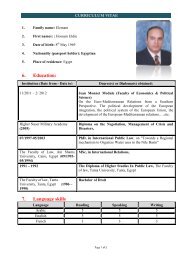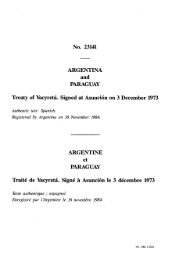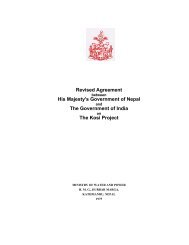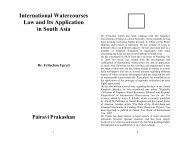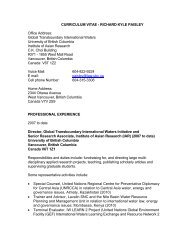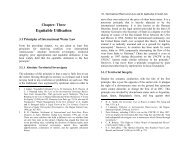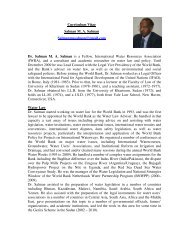Upreti, Trilochan, International Watercourses Law and Its Application ...
Upreti, Trilochan, International Watercourses Law and Its Application ...
Upreti, Trilochan, International Watercourses Law and Its Application ...
Create successful ePaper yourself
Turn your PDF publications into a flip-book with our unique Google optimized e-Paper software.
Equitable Utilisation / 105 106 / <strong>International</strong> <strong>Watercourses</strong> <strong>Law</strong> <strong>and</strong> <strong>Its</strong> <strong>Application</strong> in South Asiaupstream neighbours. As we noted in the Lake Lanouxarbitration, Spain’s objection to the French diversion wasrejected on the ground that there is no customary internationallaw that prohibits such a diversion, though it could beprohibited through a bilateral treaty. 8 In substance, this rulecould be called a veto power of the downstream state because itprohibits any significant use of water by upstream stateswithout the consent of the downstream states. The no harm rulesupports this doctrine.In the context of Indo-Nepal water relations, India objected toseveral Nepalese irrigation <strong>and</strong> hydropower projects, i.e., theSikta, West Rapti (Bhalubang-Deokhuri), Kankai, Babai, <strong>and</strong>Tamur hydropower projects, stating that these works wouldviolate the principle of territorial integrity. 9 At the end ofseveral studies carried out, donors like the World Bank, ADB<strong>and</strong> Saudi Fund declined to finance those projects on theground of downstream objections. It is worthwhile to mentionthe opposite st<strong>and</strong> taken by India whilst it was negotiating withits downstream neighbour, Pakistan, in the Ganges case <strong>and</strong>also with Pakistan during the 1948 dispute over the allocation8 R. Benhard (ed), Encyclopaedia of Public <strong>International</strong> <strong>Law</strong>:Decisions of <strong>International</strong> Courts <strong>and</strong> Tribunals <strong>and</strong> <strong>International</strong>Arbitration, the Hague: North-Holl<strong>and</strong> Comp., 1981, pp. 166-167.9 B. G. Verghese, Waters of Hope, New Delhi: Oxford & IBH Pub.,1990, p. 342. The Rapti-Bhalubhang Project, in which Canadianfinance was committed, collapsed as a result of Indian objections.Initially they had agreed with the project <strong>and</strong> later changed their st<strong>and</strong>.The Babai irrigation project was also cancelled because of the Indianobjections which the Kuwait Fund had agreed to finance. Also see H.M. Shrestha <strong>and</strong> L. M. Singh, "The Ganges-Brahmaputra System: ANepalese Perspective in the Context of Regional Co-operation" in B.G. Verghese, & T. Hashimoto (eds), Asian <strong>International</strong> Waters: FromGanges-Brahmputra to Mekong, Oxford: Oxford University, 1996, p.81-94.of the Indus river waters. 10 IWL does not support this principle.This issue will be further addressed in Chapter Four.3.1.3 Prior AppropriationThis is a bit more advanced than the two principles discussedabove. Prior appropriation provides that the state which firstutilises the waters of an international river acquires the legalright to continue to receive that quality <strong>and</strong> quantity of water infuture <strong>and</strong> cannot be deprived of it without its consent. Inpractice, however, the more developed <strong>and</strong> resourcefulcountries have had their water appropriation before <strong>and</strong> oftenare therefore in a more beneficial position than the weak orpoor countries. Therefore, it could be argued that this theoryfavours more developed states at the expense of weaker states<strong>and</strong> is not based on a fair <strong>and</strong> equitable foundation. There areseveral examples of this.In the Nile case, downstream Egypt has always laid claim to itshistoric right over the waters of the river <strong>and</strong> threatened thepoorer <strong>and</strong> weaker upstream state, Ethiopia, which is not ableto use waters that originate <strong>and</strong> flow from its territory. 11 It is anobvious but notorious disparity against international law norms.Such conduct on the part of a downstream state does notprovide equity, <strong>and</strong> a fair share of waters for such vulnerablestates like Ethiopia. In this case, Egypt warned that she woulddeclare war if the waters were utilised by upstream states <strong>and</strong>also offered the transfer of some water to Israel if she would beready to resolve the Palestine problems. 12 After the conclusionof the Camp David Treaty between Egypt <strong>and</strong> Israel, PresidentSadat talking to the Israeli press, had unveiled a plan for apipeline to bring the Nile water to the recently returned Sinai.10 India has now taken opposite st<strong>and</strong> while dealing with Nepal.11 N. Kliot, Water Resources <strong>and</strong> Conflict in the Middle East, London:Routledge, 1994, p. 68.12 Ibid.



